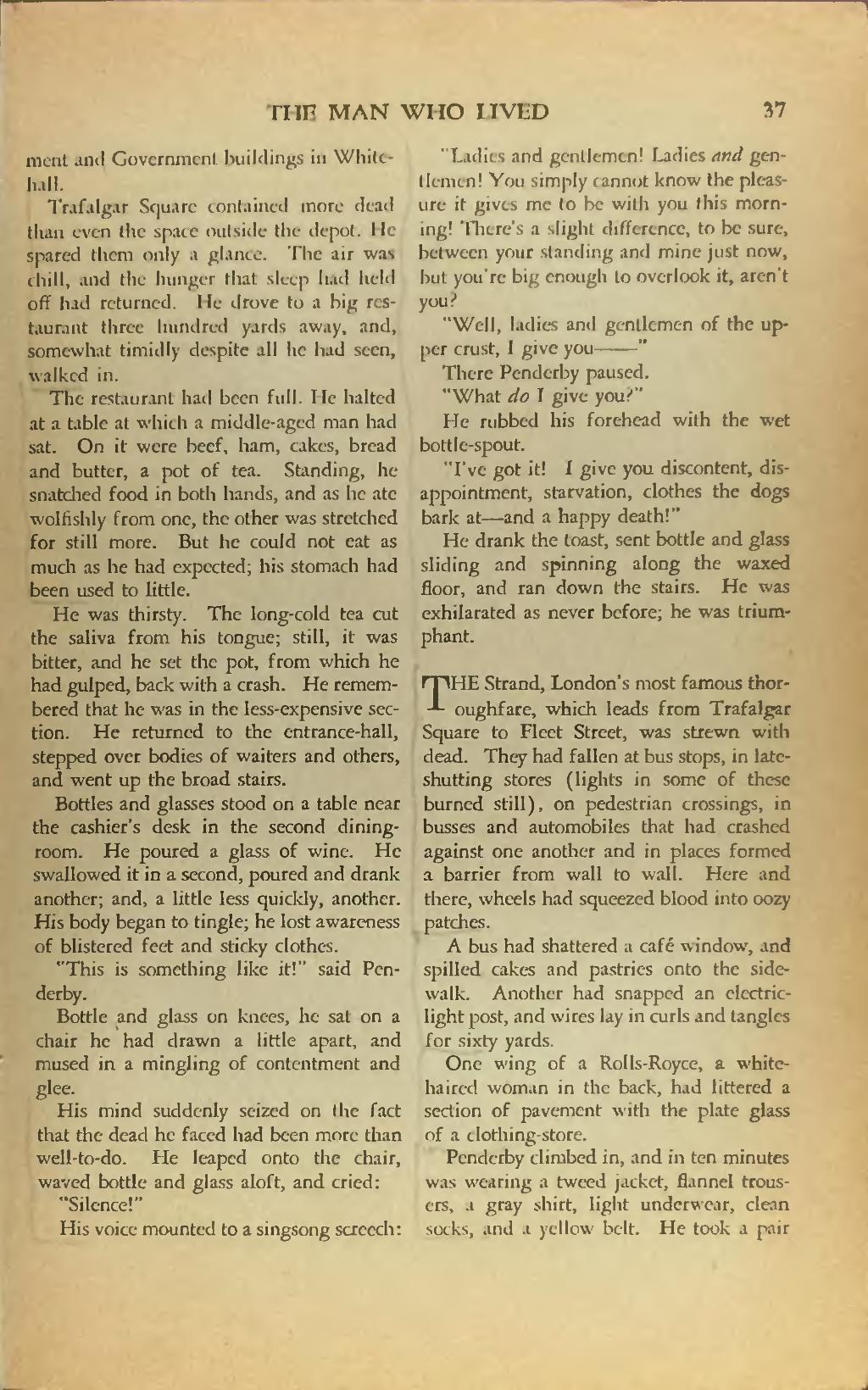ment and Government buildings in Whitehall.
Trafalgar Square contained more dead than even the space outside the depot. He spared them only a glance. The air was chill, and the hunger that sleep had held off had returned. He drove to a big restaurant three hundred yards away, and, somewhat timidly despite all he had seen, walked in.
The restaurant had been full. He halted at a table at which a middle-aged man had sat. On it were beef, ham, cakes, bread and butter, a pot of tea. Standing, he snatched food in both hands, and as he ate wolfishly from one, the other was stretched for still more. But he could not eat as much as he had expected; his stomach had been used to little.
He was thirsty. The long-cold tea cut the saliva from his tongue; still, it was bitter, and he set the pot, from which he had gulped, back with a crash. He remembered that he was in the less-expensive section. He returned to the entrance-hall, stepped over bodies of waiters and others, and went up the broad stairs.
Bottles and glasses stood on a table near the cashier's desk in the second dining-room. He poured a glass of wine. He swallowed it in a second, poured and drank another; and, a little less quickly, another. His body began to tingle; he lost awareness of blistered feet and sticky clothes.
"This is something like it!" said Penderby.
Bottle and glass on knees, he sat on a chair he had drawn a little apart, and mused in a mingling of contentment and glee.
His mind suddenly seized on the fact that the dead he faced had been more than well-to-do. He leaped onto the chair, waved bottle and glass aloft, and cried:
"Silence!"
His voice mounted to a singsong screech:
"Ladies and gentlemen! Ladies and gentlemen! You simply cannot know the pleasure it gives me to be with you this morning! There's a slight difference, to be sure, between your standing and mine just now, but you're big enough to overlook it, aren't you?
"Well, ladies and gentlemen of the upper crust, I give you"
There Penderby paused.
"What do I give you?"
He rubbed his forehead with the wet bottle-spout.
"I've got it! I give you discontent, disappointment, starvation, clothes the dogs bark at—and a happy death!"
He drank the toast, sent bottle and glass sliding and spinning along the waxed floor, and ran down the stairs. He was exhilarated as never before; he was triumphant.
The Strand, London's most famous thoroughfare, which leads from Trafalgar Square to Fleet Street, was strewn with dead. They had fallen at bus stops, in late-shutting stores (lights in some of these burned still), on pedestrian crossings, in busses and automobiles that had crashed against one another and in places formed a barrier from wall to wall. Here and there, wheels had squeezed blood into oozy patches.
A bus had shattered a café window, and spilled cakes and pastries onto the sidewalk. Another had snapped an electric-light post, and wires lay in curls and tangles for sixty yards.
One wing of a Rolls-Royce, a white-haired woman in the back, had littered a section of pavement with the plate glass of a clothing-store.
Penderby climbed in, and in ten minutes was wearing a tweed jacket, flannel trousers, a gray shirt, light underwear, clean socks, and a yellow belt. He took a pair
